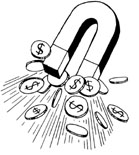
Whose Money Is It, Anyway?
DON'T RUSH IN WHERE RUSH DOESN'T FEAR TO TREAD
Some of my best friends are free-market capitalists — well, okay, I guess I should say some of my favorite economists and political theorists. With the possible exception of a cousin who owns a tavern in Queens, I don’t think I know anyone who would fit a capitalist’s definition of a capitalist. But I watch Louis Rukeyser and keep up with Forbes and The Wall Street Journal, and agree with much of what I come across in those places about the efficiencies of the free-market system. That should count for something.
I make this disclaimer to assure the reader that I am not a closet socialist of some sort, seeking to undermine free-market capitalism in the name of Catholic social theory. If someone forced me to label my economic preferences, I would say that they are an uneven amalgam, still in the crucible, of Chesterbellocian notions and George Gilder’s work. (Yes, I know that presents some dilemmas.)
So I am not posturing when I say that my criticisms of certain modern defenders of the free market are meant to be constructive. I would like to see them become more effective in their attacks on the Big Government types. My fear, however, is that they are setting themselves up for a fall by resorting to overly glib anti-government clichés about the “private” character of wealth in this country.
I am thinking of the kinds of things you hear from Rush Limbaugh and see in the columns of economic libertarians like Walter Williams and Paul Craig Roberts. The line they seem to favor about people “feeding from the public trough” is one example.
You May Also Enjoy
Dreams are for sale.
Catalogues arrive unbidden, offering raw material. The contents, chaotic like dreams,…
Good will not come from maximizing stockholder wealth, but rather from reconnecting capital to labor and communities with a stake in it.
Cheerful giving lifts man from the cold, heartless realm of business transactions to a spiritual world of liberality and abundance.

